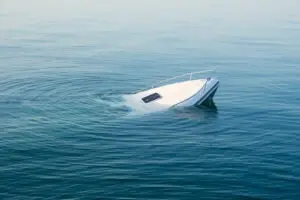
If you sustained injuries in a capsizing accident, you may have a chance to seek fair compensation with help from a Fort Myers boating accident lawyer from our team at Viles & Beckman. We can help you learn more about these accidents and your options in their aftermath.
Call or complete our online contact form to learn more.
What Happens During a Capsizing Accident?
Capsizing accidents occur anytime a boat overturns. We also use the term capsizing to refer to incidents where ships end up swamped with water. You may also hear individuals call capsizing “keeling over.”
Modern ships have many safety features designed to limit the chances of a capsizing accident. However, these incidents still occur, especially in bad weather or when boaters go out on rough water. Some boats float after capsizing, giving passengers something to hold while in the water.


Expect More, Receive More: Legal Support That Feels Like Family
How do Capsizing Accidents Occur?
Capsizing accidents have happened from the earliest times people ventured onto the water, through the shipping boom of the 19th century, and into the current day. Knowing the common types of capsizing accidents can help us stay safe on the water. These incidents are more likely to occur:
In Bad Weather Conditions
One common type of capsizing accident is when a boat takes on water due to rough weather conditions or waves. Adverse weather conditions can cause the ship to become unstable and eventually overturn.
In an Overloaded Boat
Boats may capsize if they end up overloaded with too many people or too much cargo, causing them to become imbalanced and tip over.
Due to Equipment Failures
Some capsizing accidents occur due to boat equipment failures. For example, they may occur due to:
- Loss of water tightness
- Loss of propeller
- Loss of steering system
These causative factors may make capsizing more likely, increasing the odds of an accident on fishing trawlers and other aquatic craft.
Due to a Collision
Additionally, collisions with other boats or objects in the water can represent a factor in capsizing.
It is essential to be aware of these common types of capsizing accidents and take necessary precautions to prevent them. If you sustained injuries after a capsizing accident, seek medical treatment and contact Viles & Beckman, LLC now for help.
Why Are Capsizing Accidents So Dangerous?
If your boat overturns, it can result in severe consequences and potential harm. Capsizing accidents pose significant dangers to the ship’s occupants and anyone nearby. When a boat capsizes, there is a high risk of injury or drowning, especially if individuals are not wearing life jackets or cannot swim.
Additionally, the sudden immersion in water can lead to panic and disorientation, making it difficult to escape or find safety. Capsizing accidents can also have emotional and psychological effects. The fear and trauma experienced during such an event can leave lasting impacts on individuals involved.
It is crucial to prioritize safety measures, such as proper training, life jackets, and regular maintenance, to minimize the risks of capsizing accidents.
What Kind of Boats Capsize?
Any kind of boat could end up in a capsizing accident. For example, you may face severe injuries after an accident in a:
- Fishing trawler (or other fishing boat)
- Cruise ship
- Cargo ship
- Container ship
However, accident events happen more frequently with smaller craft. People on any ship should be familiar with the location of the life rafts and other safety features to protect themselves in the event of an accident.
Can You Prevent Capsizing Accidents?
When it comes to boating safety, you must remember two key points: the importance of life jackets and proper boat maintenance.
Life jackets are not just accessories but essential tools that can save lives in case of an accident. Additionally, ensuring proper boat maintenance is crucial for preventing mechanical failures or malfunctions that could lead to dangerous situations on the water.
Importance of Life Jackets
Wearing life jackets is crucial in preventing drowning in a capsizing accident. When a boat capsizes, it can happen suddenly and without warning. It is easy to panic and lose control in that moment of chaos. However, if you have your life jacket on, you give yourself the best chance of survival.
Life jackets provide buoyancy, even if you are unconscious or unable to swim. They help distribute your weight evenly, making it easier to stay afloat and conserve energy. Additionally, life jackets are brightly colored, which makes it easier for rescuers to spot you in the water.
Proper Boat Maintenance
We all know how exciting it is to be out on the water. Still, you must prioritize your safety. Regular boat maintenance helps prevent accidents, protects the people on board, and ensures that your vessel is in good working condition.
First, make sure to check the hull for any cracks or damage. Repairing these issues promptly can prevent water from entering the boat and causing instability or property damage.
Additionally, inspect the engine, steering system, and electrical components regularly. Properly functioning equipment is crucial for safe navigation. Remember to check and replace any worn-out safety equipment, such as life jackets and fire extinguishers.
Who Is Liable for a Capsizing Accident?
If you’re involved in a capsizing accident, understanding liability and seeking compensation can be crucial for your recovery. The boat owner, operator, or manufacturer may hold the blame for these accidental events.
Once lawyers establish liability, you may receive compensation for your injuries, medical expenses, and any other damages you suffered from the accident.
Seeking compensation is complex, often involving insurance companies and legal procedures. It is essential to consult with an experienced attorney who can guide you through the process and fight for your rights.
What Are the Legal Implications and Consequences of Capsizing Accidents?
There may be legal requirements for reporting the accident to the appropriate authorities within a specific timeframe. Failure to comply with these regulations could result in further legal consequences.
Furthermore, the legal ramifications become even more complex if injuries or fatalities occur. Understanding maritime accident laws and regulations is vital to protect your rights and navigate the legal process effectively.
Your attorney can review the wreck’s critical influencing factors and discuss options to bring you fair compensation for all your losses.
Contact Us After a Capsizing Accident
What is a capsizing accident? Any accident that causes a boat to flip over may qualify as a capsizing accident.
Capsizing accidents are hazardous and can have profound implications. They can occur due to various causes, such as rough weather conditions, overloading, or improper boat maintenance.
Understanding the common types of capsizing accidents and the factors that contribute to them is essential for preventing such incidents. For more information about legal representation regarding boating accidents, contact Viles & Beckman, LLC.



